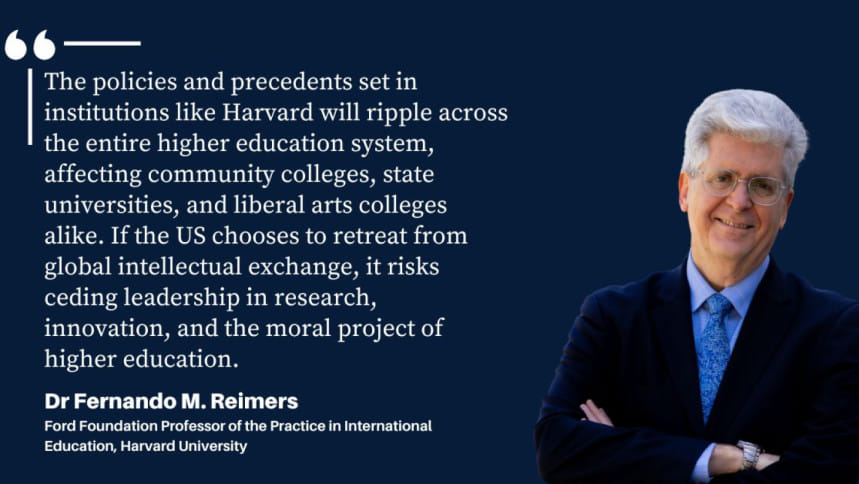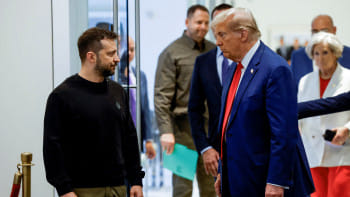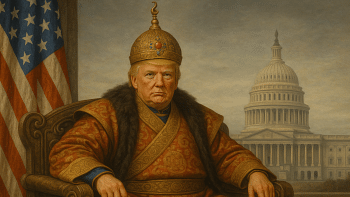Harvard vs Trump: 'Limiting international participation would impoverish our academic mission'

On May 22, 2025, the US Department of Homeland Security revoked Harvard University's certification to enrol international students, which threatened the legal status of nearly 6,800 international students—about 27 percent of the university's student body—and placed many global academic partnerships in jeopardy. In the midst of the unfolding crisis, Dr Fernando M. Reimers, the Ford Foundation Professor of the Practice in International Education at Harvard, speaks with Sarzah Yeasmin, contributor to The Daily Star, about the battle between Harvard and US President Donald Trump, and the repercussions for global education and democracy in the interconnected world today.
How do you believe the removal of international enrolment would affect not just Harvard, but the broader landscape of higher education in the US?
The removal of international enrolment would have devastating consequences not just for Harvard but for American higher education as a whole. International students and scholars are essential to the vitality, innovation, and relevance of our universities. Without their contributions, our higher education system would become more insular and parochial, undermining America's long-standing leadership in global knowledge creation and problem-solving. Ultimately, it weakens the openness and excellence that attract the world's brightest minds.
In truth, universities do not exist in a vacuum. Their legitimacy and excellence depend on their ability to serve as meeting grounds for diverse experiences, cultures, and perspectives. Removing international students means removing a central pillar of our academic ecosystem—one that enables our institutions to educate global citizens and produce knowledge that reflects the complexities of our shared world.
This policy would deprive Harvard of a resource essential to its mission. The advancement of knowledge and the improvement of the human condition through education are possible only when ideas cross borders and diverse minds collaborate. The presence of international students and scholars is not an accessory to the academic mission; it is central to it.
In what ways does Harvard's history of international engagement serve as a model for the role that universities should play in geopolitics?
Harvard's commitment to international engagement and vision for global engagement dates back to Charles William Eliot, Harvard's 22nd president, who transformed the university into a global institution by expanding international faculty and graduate programmes. Eliot's efforts demonstrate how Harvard's identity and excellence are historically tied to looking beyond national borders. This openness has enabled Harvard to address global challenges and improve the human condition through education and research. In today's interconnected world, universities must model this spirit of dialogue and partnership if they are to serve as engines of progress and innovation.
There is an ethical imperative for universities to participate in shaping a peaceful and just world, and that requires meaningful collaboration across national boundaries. Harvard's ability to support inclusive global development has always been linked to its willingness to be shaped by voices beyond its borders. This example—of intellectual humility and shared problem-solving—should be emulated widely.
How would limiting international student and scholar participation specifically undermine any university's academic mission and research capabilities?
Limiting international participation would fundamentally impoverish our academic mission. The very advancement of knowledge relies on the free exchange of ideas across borders. International students and scholars bring essential perspectives, expertise, and creativity, enriching teaching, learning, and research. Excluding them weakens our ability to tackle global challenges and limits the university's capacity for innovation and excellence.
It is in the presence of cultural and disciplinary diversity that ideas mature. The global academy thrives on constructive tension and collective inquiry. Curtailing participation from beyond our borders jeopardizes the very conditions that make scholarship transformative. Science and scholarship are inherently global enterprises. Throughout history, the greatest breakthroughs have emerged when researchers have been free to collaborate, build upon each other's work, and join forces on projects of common concern. This freedom to engage across borders is essential to academic vitality.
The current confrontation extends well beyond administrative policy—it touches the core of what a university is and whom it serves. At stake is not merely the continuity of international enrolment, but the philosophical and civic foundations of higher education itself. In an era defined by geopolitical fragmentation and rising authoritarianism, the university must remain a space of principled openness, intellectual pluralism, and global responsibility.
What do you see as the long-term risks to higher education institutions when government actions are used to exert political pressure on curriculum, admissions or faculty decisions?
The long-term risks are severe. When governments attempt to dictate curriculum, admissions or hiring for political purposes, they erode the autonomy that is central to universities' roles in a democracy. This stifles academic freedom, undermines trust in institutions, and leads to intellectual stagnation. Over time, such interference could irreparably damage the integrity, credibility, and global reputation of American higher education.
Such pressures do not just threaten governance; they threaten purpose. Universities that become captive to political directives cease to serve the common good. They risk becoming provincial institutions, incapable of helping societies navigate the moral and technological dilemmas of our time. The erosion of institutional autonomy threatens not just academic freedom, but the university's democratic purpose.
How should universities protect their autonomy while continuing to engage with governments and policymakers?
Universities must remain steadfast in defending their mission and core principles while constructively engaging with policymakers. This requires clear legal and policy protections for academic freedom and institutional independence. At the same time, universities should foster transparent, principled dialogue with governments, advocating for the critical societal role that education plays while refusing to accept undue political interference.
Engagement must always be grounded in integrity. Universities can and should work with governments, but only in ways that preserve their moral compass and their primary allegiance—to truth, to inclusion, and to the long-term public interest. Autonomy of universities is essential to a functioning democracy. Universities serve as spaces to envision a better future and to bring people together to realise that vision. Political interference compromises this mission at its root.
What concrete steps should the academic community and the public take to defend global academic collaboration and institutional independence in the face of political interference?
The academic community and the public must mobilise to challenge any encroachments on academic freedom and diversity. This entails legal challenges to unlawful government actions, robust advocacy for the value of openness and international collaboration and forming alliances with civil society and political leaders who support institutional independence. It also means educating the public about the essential role global engagement and academic autonomy play in addressing humanity's greatest challenges.
There is a civic duty here: to defend the university not as a sanctuary for the elite, but as a platform for solving global problems. By building coalitions, protecting institutional independence, and reinforcing public trust, universities can serve not just national interests but a global future. Protecting international engagement is about protecting the spirit of inquiry and collaboration that defines a free society.
What are the broader implications of this moment for higher education in the US and its global role?
The current confrontation extends well beyond administrative policy—it touches the core of what a university is and whom it serves. At stake is not merely the continuity of international enrolment, but the philosophical and civic foundations of higher education itself. In an era defined by geopolitical fragmentation and rising authoritarianism, the university must remain a space of principled openness, intellectual pluralism, and global responsibility. Defending academic freedom and cross-border engagement is not a defensive act; it is an affirmation of higher education's most enduring values.
This moment also calls for a wider reckoning within the education landscape of the US. The policies and precedents set in institutions like Harvard will ripple across the entire higher education system, affecting community colleges, state universities, and liberal arts colleges alike. If the US chooses to retreat from global intellectual exchange, it risks ceding leadership in research, innovation, and the moral project of higher education. The health of American democracy, and its place in the world, will be shaped by whether its universities remain open, independent, and truly global.
Sarzah Yeasmin is a policy analyst working on the intersections of education and development economics. She is an alumna of Harvard University.
Follow The Daily Star Opinion on Facebook for the latest opinions, commentaries and analyses by experts and professionals. To contribute your article or letter to The Daily Star Opinion, see our guidelines for submission.

 For all latest news, follow The Daily Star's Google News channel.
For all latest news, follow The Daily Star's Google News channel. 










Comments